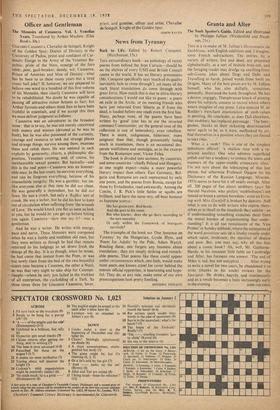News from Tyranny
Back to Life. Edited by Robert Conquest. (Hutchinson, 15s.) THIS extraordinary book—an anthology of recent poems from behind the Iron Curtain—should be on the shelves of every USIS and British Council centre in the world. It has no literary pretensions (Mr. Conquest specifically says 'much of its quality inevitably fails to come through'), yet many of the stark literal translations do come through with great force. How much this is due to extra-literary considerations I would not like to guess : a poem on exile in the Arctic, or on meeting friends who have just returned from Siberia as if from the dead, is loaded before one reads even the first line. Many, perhaps most, of the poems have been written by `good' (one has to use the inverted commas) Communists; yet the general tone of the collection is one of heterodoxy, even rebellion. There is satire, indignation, bitterness; more poignant than that, though presumably losing much in translation, there is an occasional des- perate wistfulness and nostalgia, as in the excerpt from the Rumanian poet, Victor Felea.
The book is divided into sections, by countries, and some countries—chiefly Poland and Hungary, as one might expect—make a more powerful literary impact than others. East Germany, Bul- garia and Rumania are each represented by only one poem, and the poems from Russia, except for those by Evtushenko, read awkwardly. Among the Czechs, J. R. Pick's little fables or squibs are brilliant, and have the same wry, offbeat humour as Japanese senrytt:
She has green eyes. Red beads.
And she goes to his room.
But who knows: does she go there according to the new morality
Or only within the framework of bourgeois survivals?
The triumphs of the book are 'One Sentence on Tyranny' by the Hungarian, Gyula Illyes, and 'Poem for Adults' by the Pole, Adam Wazyk. Reading these, one forgets any business about translation : they are simply striking and remark- able poems. That poems like these could appear under circumstances which, one feels, would make most poets one knows crawl for cover behind the nearest official typewriter, is heartening and hope- ful. They do, at any rate, make some of our own preoccupations look pretty footling.
ANTHONY THWAITI,

























 Previous page
Previous page